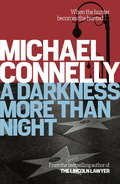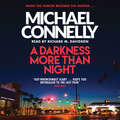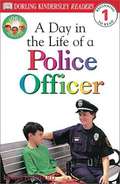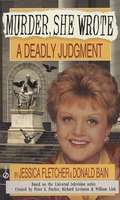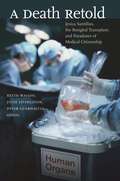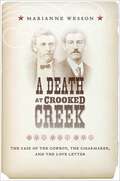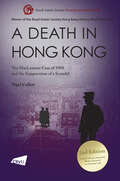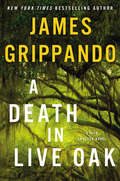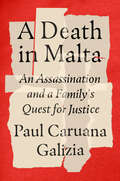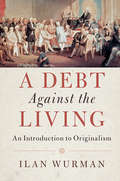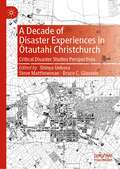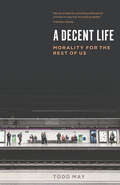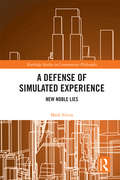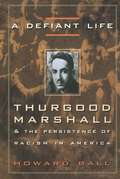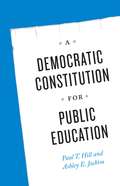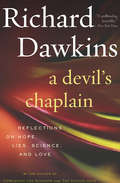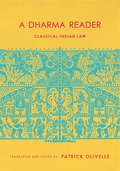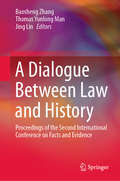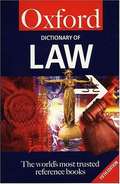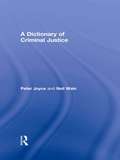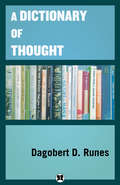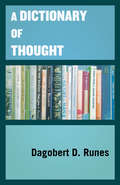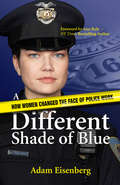- Table View
- List View
A Darkness More Than Night (Harry Bosch Series #7)
by Michael ConnellyHarry Bosch meets an ex-FBI profiler in one of the most disturbing cases he has faced . . . From the bestselling author of THE LINCOLN LAWYER. Terry McCaleb's enforced quiet lifestyle on the island of Catalina is a far cry from the hectic excitement of his former role as an FBI profiler. However, when small-time criminal Edward Gunn is found dead, McCaleb becomes embroiled in a disturbing and complex case leading him to cross the path of Harry Bosch. This infamous detective has always teetered on the brink of darkness in order to get inside the head of the killer. Is it possible that he has stepped across that finely drawn line and embraced darkness?
A Darkness More Than Night (Harry Bosch Series #7)
by Michael ConnellyTerry McCaleb's enforced quiet lifestyle on the island of Catalina is a far cry from the hectic excitement of his former role as an FBI profiler. However, when small-time criminal Edward Gunn is found dead, McCaleb becomes embroiled in a disturbing and complex case leading him to cross the path of Harry Bosch. This infamous detective has always teetered on the brink of darkness in order to get inside the head of the killer. Is it possible that he has stepped across that finely drawn line and embraced darkness?Read by Richard M Davidson(p) 2001 Hachette Audio
A Day in the Life of a Police Officer (Darling Kindersley Readers )
by Linda HaywardThe duties of police officers are simply explained to young readers in this book that features short sentences, simple vocabulary, word repetition, and visual clue to help readers learn new words.
A Deadly Judgment: A Murder, She Wrote Mystery
by Donald Bain Jessica FletcherMURDER IN BEANTOWN. Jessica Fletcher is off to Boston to help her eccentric lawyer friend, Malcolm McLoon, defend a tycoon accused of fratricide. Her uncanny sleuthing talents will come in handy when the two old acquaintances dive into the case with their characteristic vigor. Even so, Jessica anticipates enough time to take in the charming sights of New England's historic capital. But when the defendant's girlfriend--and his only alibi--is found dead in her apartment, the case takes one more murderous turn for the worse. Is someone out to make sure the accused gets convicted? Jessica has her suspicions, and soon--when the jurors become victims of deadly accidents--there's even more to ponder. With only her gut feelings at work for her, Jessica must outwit the tenacious prosecutor determined to get a guilty verdict. She must find the real culprit--before the killer finds her ...
A Death Retold
by Julie Livingston Peter Guarnaccia Keith WailooIn February 2003, an undocumented immigrant teen from Mexico lay dying in a prominent American hospital due to a stunning medical oversight--she had received a heart-lung transplantation of the wrong blood type. In the following weeks, Jesica Santillan's tragedy became a portal into the complexities of American medicine, prompting contentious debate about new patterns and old problems in immigration, the hidden epidemic of medical error, the lines separating transplant "haves" from "have-nots," the right to sue, and the challenges posed by "foreigners" crossing borders for medical care.This volume draws together experts in history, sociology, medical ethics, communication and immigration studies, transplant surgery, anthropology, and health law to understand the dramatic events, the major players, and the core issues at stake. Contributors view the Santillan story as a morality tale: about the conflicting values underpinning American health care; about the politics of transplant medicine; about how a nation debates deservedness, justice, and second chances; and about the global dilemmas of medical tourism and citizenship.Contributors:Charles Bosk, University of PennsylvaniaLeo R. Chavez, University of California, IrvineRichard Cook, University of ChicagoThomas Diflo, New York University Medical CenterJason Eberl, Indiana University-Purdue University IndianapolisJed Adam Gross, Yale University Jacklyn Habib, American Association of Retired PersonsTyler R. Harrison, Purdue UniversityBeatrix Hoffman, Northern Illinois UniversityNancy M. P. King, University of North Carolina at Chapel HillBarron Lerner, Columbia University Mailman School of Public HealthSusan E. Lederer, Yale UniversityJulie Livingston, Rutgers UniversityEric M. Meslin, Indiana University School of Medicine and Indiana University-Purdue University IndianapolisSusan E. Morgan, Purdue UniversityNancy Scheper-Hughes, University of California, BerkeleyRosamond Rhodes, Mount Sinai School of Medicine and The Graduate Center, City University of New YorkCarolyn Rouse, Princeton UniversityKaren Salmon, New England School of LawLesley Sharp, Barnard and Columbia University Mailman School of Public HealthLisa Volk Chewning, Rutgers UniversityKeith Wailoo, Rutgers University
A Death at Crooked Creek: The Case of the Cowboy, the Cigarmaker, and the Love Letter
by Marianne Wesson"This is anextraordinary and ground-breaking book, a wonderfully creative mix of fact andtheory, imagination and drama. Anyone with an interest in law, history, or, forthat matter, great storytelling will fall in love with A Death at Crooked Creek. The startling origin of the complex'intention exception' to the hearsay evidence rule becomes canvas on which agrand and marvelously detailed tale is told. This is modern narrative at itsbest: a marriage of spectacular writing and hard, documented truth presented bya brilliant author who doubles as a gifted and fastidious legal scholar andhistorian."—Andrew Popper,American UniversityOne winter night in1879, at a lonely Kansas campsite near Crooked Creek, a man was shot to death.The dead man’s traveling companion identified him as John Hillmon, a cowboyfrom Lawrence who had been attempting to carve out a life on the blusteryprairie. The case might have been soon forgotten and the apparent widow, SallieHillmon, left to mourn—except for the $25,000 life insurance policies Hillmonhad taken out shortly before his departure. The insurance companies refused topay on the policies, claiming that the dead man was not John Hillmon, andSallie was forced to take them to court in a case that would reach the SupremeCourt twice. The companies’ case rested on a crucial piece of evidence: a fadedlove letter written by a disappeared cigarmaker, declaring his intent to travelwestward with a “man named Hillmon.”In A Death atCrooked Creek, Marianne Wesson re-examines the long-neglected evidence inthe case of the Kansas cowboy and his wife, recreating the court scenes thatled to a significant Supreme Court ruling on the admissibility of hearsayevidence. Wesson employs modern forensic methods to examine the body of thedead man, attempting to determine his true identity and finally put thisfascinating mystery to rest.This engaging andvividly imagined work combines the drama, intrigue, and emotion of excellentstorytelling with cutting-edge forensic investigation techniques and legaltheory. Wesson’s superbly imagined A Death at Crooked Creek willhave general readers, history buffs, and legal scholars alike wondering whetherhistory, and the Justices, may have misunderstood altogether the events at thatbleak winter campsite.
A Death for a Dancing Doll (Robert Forsythe-Abigail Sanderson Mystery #9)
by E. X. GirouxThis latest Robert Forsythe-Abigail Sanderson mystery, A Death for a Dancing Doll, focuses on the wealthy, unconventional Holly-Pulos family of Western Canada. London barrister-sleuth Forsythe and his trusty secretary, Sandy are in Canada on vacation, taking advantage of the hospitality of a friend of Forsythe's, who has offered them a hotel suite. Their vacation is interrupted by an appeal from Rebecca Holly, who is distraught over the death of her granddaughter, Thalia, a promising young dancer. Rebecca doesn't believe the accepted verdict of suicide, and she wants Forsythe to find the truth-- and the killer. But pursuing any kind of investigation in the Holly-Pulos household won't be easy. Harriet Holly-Pulos, Thalia's aunt, is enigmatic and unapproachable; Dmitri Pulos, Harriet's much younger second husband, is not exactly forthcoming. When Forsythe and Sandy learn that Thalia's is not the first death in the family--that Harriet and Dmitri's little daughter, Iona, had died recently in a horrible accident; that Harriet's first husband had also died too young--they fear that their vacation is at an end and that the murders may have only just begun.
A Death in Hong Kong: The MacLennan Case of 1980 and the Suppression of a Scandal (2nd Edition) (Royal Asiatic Society Hong Kong Studies)
by Nigel CollettIn January 1980, a young police officer named John MacLennan committed suicide in his Ho Man Tin flat. His death came mere hours before he was to be arrested for committing homosexual acts still, at that point, illegal in Hong Kong. But this was more than the desperate act of a young man, ashamed and afraid; both his death and the subsequent investigation were a smokescreen for a scandal that went to the heart of the establishment. MacLennan came to Hong Kong from Scotland during a tumultuous time in Hong Kong's history. The governorship of Sir Murray MacLehose was to be a time of reform and progress, but with that remit came the determination of many to suppress scandals and silence those who stirred up trouble. Both the life and death of John MacLennan seemed to many of those in power to threaten the stability of one of Britain's last colonies. The second edition includes a foreword by Christine Loh (former undersecretary for the environment, former legislator, and founder of Civic Exchange) as well as updated information from new interviews with key people involved in the case. With endorsements from human rights researchers and the local community, this book provides insight into Hong Kong during a time of social unrest and corruption scandals, a time when homosexuality and paedophilia were often considered interchangeable and both offered easy targets for blackmail.
A Death in Live Oak: A Jack Swyteck Novel (Jack Swyteck Novel #14)
by James GrippandoFrom the 2017 winner of the Harper Lee Prize for legal fiction comes a powerful and timely story of race, politics, injustice, and murder as shocking and incendiary as today’s headlines. When the body of Jamal Cousin, president of the pre-eminent black fraternity at the Florida's flagship university, is discovered hogtied in the Stygian water swamps of the Suwanee River Valley, the death sets off a firestorm that threatens to rage out of control when a fellow student, Mark Towson, the president of a prominent white fraternity, is accused of the crime. Contending with rising political tensions, racial unrest, and a sensational media, Towson’s defense attorney, Jack Swyteck, knows that the stakes could not be higher—inside or outside the old Suwanee County Couthouse. The evidence against his client, which includes a threatening text message referencing "strange fruit" on the river, seems overwhelming. Then Jack gets a break that could turn the case. Jamal's gruesome murder bears disturbing similarities to another lynching that occurred back in the Jim Crow days of 1944. Are the chilling parallels purely coincidental? With a community in chaos and a young man’s life in jeopardy, Jack will use every resource to find out. As he navigates each twist and turn of the search, Jack becomes increasingly convinced that his client may himself be the victim of a criminal plan more sinister than the case presented by the state attorney. Risking his own reputation, this principled man who has devoted his life to the law plunges headfirst into the darkest recesses of the South’s past, and its murky present, to uncover answers. For Jack, it's about the truth. Traversing time, from the days of strict segregation to the present, he’ll find it—no matter what the cost—and bring much-needed justice to Suwanee County.
A Death in Malta: An Assassination and a Family's Quest for Justice
by Paul Caruana Galizia&“A chronicle of the sort of silencing-by-murder that we might have thought happens only in Vladimir Putin&’s Russia. . . . [and] a son&’s distraught but beautiful tribute to his journalist-mother. . . . Exquisite.&” —Wall Street JournalA journalist&’s spellbinding account of the shocking murder of his muckraking mother and a quest for justice that has reverberated far beyond their tiny homelandAn archipelago off the southern coast of Italy, Malta is a picturesque gem eroded by a climate of corruption, polarization, inequality, and a virtual absence of civic spirit. In this unpromising soil, a fearless journalist took root. Daphne Caruana Galizia fashioned herself into the country&’s lonely voice of conscience, her muckraking and editorializing sending shock waves that threatened to topple those in power and made her at once the island&’s best-known figure and its most reviled. In 2017, a campaign of intimidation against her culminated in a car bombing that took her life. Daphne was also he devoted and inspiring mother to three sons, who with their father have carried on the quest for justice and transparency after her death. Spellbindingly narrated by the youngest of them, the award-winning journalist Paul Caruana Galizia, A Death in Malta is at once a study in heroism and the powerful story of a family&’s crusade for accountability in a society built on lies, with reverberations far beyond their homeland.
A Debt Against the Living: An Introduction to Originalism
by Ilan WurmanThomas Jefferson famously wrote that the earth belongs to the living. His letter to James Madison is often quoted for the proposition that we should not be bound to the 'dead hand of the past', suggesting that the Constitution should instead be interpreted as a living, breathing document. Less well-known is Madison's response, in which he said the improvements made by the dead - including the US Constitution - form a debt against the living, who benefit from them. In this illuminating book, Ilan Wurman introduces Madison's concept of originalism to a new generation and shows how it has shaped the US Supreme Court in ways that are expected to continue following the death of Justice Antonin Scalia, one of the theory's leading proponents. It should be read by anyone seeking a better understanding of originalism and its ongoing influence on the constitutional jurisprudence of the Supreme Court.
A Decade of Disaster Experiences in Ōtautahi Christchurch: Critical Disaster Studies Perspectives
by Bruce C. Glavovic Steve Matthewman Shinya UekusaThis book critically surveys a decade of disasters in Ōtautahi Christchurch. It brings together a diverse range of authors, disciplinary approaches and topics, to reckon with the events that commenced with the 2010-2011 Canterbury earthquake sequence. Each contribution tackles its subject matter through the frame of Critical Disaster Studies (CDS). The events and the subsequent recovery provide a once-in-a-lifetime opportunity to learn from a series of concatenating urban disasters in order to prepare us for our future on an urban planet facing unprecedented environmental pressures. The book focuses on the production of vulnerability, the human dimensions of disaster, the Indigenous response to disasters and the practical lessons that can be drawn from them.
A Decent Life: Morality for the Rest of Us
by Todd May“In lively prose, May . . . breaks down complex philosophical concepts and uses a range of everyday examples to illustrate how morality can be practical.” —Publishers WeeklyIn a world full of suffering and deprivation, it’s easy to despair—and it’s also easy to judge ourselves for not doing more. Even if we gave away everything we own and devoted ourselves to good works, it wouldn’t solve all the world’s problems. It would make them better, though. So is that what we have to do? Is anything less a moral failure? Can we lead a fundamentally decent life without taking such drastic steps?Todd May has answers. He’s not the sort of philosopher who tells us we have to be model citizens who display perfect ethics in every decision we make. He’s realistic: he understands that living up to ideals is a constant struggle. In A Decent Life, May leads readers through the traditional philosophical bases of a number of arguments about what ethics asks of us, then he develops a more reasonable and achievable way of thinking about them, one that shows us how we can use philosophical insights to participate in the complicated world around us. He explores how we should approach the many relationships in our lives—with friends, family, animals, people in need—through the use of a more forgiving, if no less fundamentally serious, moral compass. With humor, insight, and a lively and accessible style, May opens a discussion about how we can, realistically, lead the good life that we aspire to.“A meditation on how striving for decency is a route towards personal satisfaction and happiness.” —Chicago Tribune
A Defense of Simulated Experience: New Noble Lies (Routledge Studies in Contemporary Philosophy)
by Mark SilcoxThis book defends an account of the positive psychological, ethical, and political value of simulated human experience. Philosophers from Plato and Augustine to Heidegger, Nozick, and Baudrillard have warned us of the dangers of living on too heavy a diet of illusion and make-believe. But contemporary cultural life provides broader, more attractive opportunities to do so than have existed at any other point in history. The gentle forms of self-deceit that such experiences require of us, and that so many have regarded as ethically unwholesome or psychologically self-destructive, can in fact serve as vital means to political reconciliation, cultural enrichment, and even (a kind of) utopia. The first half of the book provides a highly schematic definition of simulated experience and compares it with some claims about the nature of simulation made by other philosophers about what it is for one thing to be a simulation of another. The author then provides a critical survey of the views of some major authors about the value of certain specific types of simulated experience, mainly in order to point out the many puzzling inconsistencies and ambiguities that their thoughts upon the topic often exhibit. In the second half of the book, the author defends an account of the positive social value of simulated experience and compares his own position to the ideas of a number of utopian political thinkers, as well as to Plato's famous doctrine of the "noble lie." He then makes some tentative practical suggestions about how a proper appreciation of the value of simulated experience might influence public policy decisions about such matters as the justification of taxation, paternalistic "choice management," and governmental transparency. A Defense of Simulated Experience will appeal to a broad range of philosophers working in normative ethics, aesthetics, the philosophy of technology, political philosophy, and the philosophy of culture who are interested in questions about simulated experience. The book also makes a contribution to the emerging field of Game Studies.
A Defiant Life: Thurgood Marshall and the Persistence of Racism in America
by Howard BallThurgood Marshall's extraordinary contribution to civil rights and overcoming racism is more topical than ever, as the national debate on race and the overturning of affirmative action policies make headlines nationwide. Howard Ball, author of eighteen books on the Supreme Court and the federal judiciary, has done copious research for this incisive biography to present an authoritative portrait of Marshall the jurist.Born to a middle-class black family in "Jim Crow" Baltimore at the turn of the century, Marshall's race informed his worldview from an early age. He was rejected by the University of Maryland Law School because of the color of his skin. He then attended Howard University's Law School, where his racial consciousness was awakened by the brilliant lawyer and activist Charlie Houston. Marshall suddenly knew what he wanted to be: a civil rights lawyer, one of Houston's "social engineers." As the chief attorney for the NAACP, he developed the strategy for the legal challenge to racial discrimination. His soaring achievements and his lasting impact on the nation's legal system--as the NAACP's advocate, as a federal appeals court judge, as President Lyndon Johnson's solicitor general, and finally as the first African American Supreme Court Justice--are symbolized by Brown v. Board of Education, the landmark case that ended legal segregation in public schools. Using race as the defining theme, Ball spotlights Marshall's genius in working within the legal system to further his lifelong commitment to racial equality. With the help of numerous, previously unpublished sources, Ball presents a lucid account of Marshall's illustrious career and his historic impact on American civil rights.From the Hardcover edition.
A Democratic Constitution for Public Education
by Paul T. Hill Ashley E. JochimAmerica's education system faces a stark dilemma: it needs governmental oversight, rules and regulations, but it also needs to be adaptable enough to address student needs and the many different problems that can arise at any given school-something that large educational bureaucracies are notoriously bad at. The authors offer a solution.
A Devil's Chaplain: Reflections on Hope, Lies, Science, and Love
by Richard DawkinsEssays on morality, mortality, and much more from the New York Times–bestselling author of The Selfish Gene and The God Delusion. This early collection of essays from renowned evolutionary biologist Richard Dawkins is an enthusiastic declaration, a testament to the power of rigorous scientific examination to reveal the wonders of the world. In these essays, Dawkins revisits the meme, the unit of cultural information that he named and wrote about in his groundbreaking work, The Selfish Gene. Here also are moving tributes to friends and colleagues, including a eulogy for novelist Douglas Adams, author of The Hitchhiker&’s Guide to the Galaxy; correspondence with fellow biologist Stephen Jay Gould; commentary on the events of 9/11; and visits with the famed paleoanthropologists Richard and Meave Leakey at their African wildlife preserve. Ending with a vivid note to Dawkins&’s ten-year-old daughter, reminding her to remain curious, ask questions, and live the examined life, A Devil&’s Chaplain is a fascinating read by &“a man of firm opinions, which he expresses with clarity and punch&” (Scientific American).
A Dharma Reader: Classical Indian Law (Historical Sourcebooks in Classical Indian Thought)
by Patrick OlivelleWhether defined by family, lineage, caste, professional or religious association, village, or region, India's diverse groups did settle on a concept of law in classical times. How did they reach this consensus? Was it based on religious grounds or a transcendent source of knowledge? Did it depend on time and place? And what apparatus did communities develop to ensure justice was done, verdicts were fair, and the guilty were punished?Addressing these questions and more, A Dharma Reader traces the definition, epistemology, procedure, and process of Indian law from the third century B.C.E. to the middle ages. Its breadth captures the centuries-long struggle by Indian thinkers to theorize law in a multiethnic and pluralist society. The volume includes new and accessible translations of key texts, notes that explain the significance and chronology of selections, and a comprehensive introduction that summarizes the development of various disciplines in intellectual-historical terms. It reconstructs the principal disputes of a given discipline, which not only clarifies the arguments but also relays the dynamism of the fight. For those seeking a richer understanding of the political and intellectual origins of a major twenty-first-century power, along with unique insight into the legal interactions among its many groups, this book offers exceptional detail, historical precision, and expository illumination.
A Dialogue Between Law and History: Proceedings of the Second International Conference on Facts and Evidence
by Jing Lin Baosheng Zhang Thomas Yunlong ManThis book builds on the success of the First International Conference on Facts and Evidence: A Dialogue between Law and Philosophy (Shanghai, China, May 2016), which was co-hosted by the Collaborative Innovation Center of Judicial Civilization (CICJC) and East China Normal University. The Second International Conference on Facts and Evidence: A Dialogue between Law and History was jointly organized by the CICJC, the Institute of Evidence Law and Forensic Science (ELFS) at China University of Political Science and Law (CUPL), and Peking University School of Transnational Law (STL) in Shenzhen, China, on November 16–17, 2019. Historians, legal scholars and legal practitioners share the same interest in ascertaining the “truth” in their respective professional endeavors. It is generally recognized that any historical study without truthful narration of historical events is fiction and that any judicial trial without accurate fact-finding is a miscarriage of justice. In both historical research and the judicial process, practitioners are invariably called upon, before making any arguments, to prove the underlying facts using evidence, regardless of how the concept is defined or employed in different academic or practical contexts. Thus, historians and legal professionals have respectively developed theories and methodological tools to inform and explain the process of gathering evidentiary proof. When lawyers and judges reconsider the facts of cases, “questions of law” are actually a subset of “questions of fact,” and thus, the legal interpretation process also involves questions of “historical fact.” The book brings together more than twenty leading history and legal scholars from around the world to explore a range of issues concerning the role of facts as evidence in both disciplines. As such, the book is of enduring value to historians, legal scholars and everyone interested in truth-seeking.
A Dictionary of Law (5th edition)
by Elizabeth A. MartinWritten in clear, jargon-free language, this dictionary provides over 4,000 concise, informative entries on all aspects of English law. Considerably revised and expanded for this sixth edition it includes a wealth of new features such as weblinks, feature entries, and a supplement on writing legal essays. Invaluable for students, professionals, and the general reader needing clarification of legal terms.
A Dictionary of Criminal Justice
by Peter Joyce Neil WainA Dictionary of Criminal Justice is the only dictionary that deals with criminal justice from a UK perspective, and in doing so provides a comprehensive guide to all aspects of the British criminal justice system, including its historical context and contemporary operations. The first three sections of the book explore in turn key definitions, key pieces of legislation and key documents that have helped to shape the operations of the criminal justice system, whilst the fourth details websites of particular relevance to this field. As such, this dictionary provides an extensive but accessible introduction to the important terms that relate to both the development and the contemporary processes of criminal justice. It also succeeds in placing the UK criminal justice system within an international setting through the inclusion of entries that acknowledge the global setting in which British justice operates. Guides to key legislation and documents are included, and each definition is accompanied by references for further reading, making this book an invaluable learning tool for both students and practitioners of criminal justice.
A Dictionary of Thought
by Karl Marx Dagobert D. RunesThis dictionary, from the pen of the well-known philosopher Dagobert D. Runes, is offered as an attempt to define the borderlines of human thinking and human morality. In 152 pages organized alphabetically, Dr. Runes has created a dictionary of his own philosophical musings indexed by evocative words. Each word is followed by up to several single sentence aphorisms and occasionally a short essay. As a collection, they cover an extremely broad range of topics. In his search for real verities and true humanity, he takes the reader on an arduous thought-provoking voyage through the depths of the mind. This type of soul-searching philosophy, unburdened by traditional manner and terminology, is sometimes baffling, frequently of melancholy character, but almost always fascinating and inspiring.
A Dictionary of Thought
by Dagobert D. RunesAn A-to-Z collection of thoughtful aphorisms and ruminations by the philosopher and founder of the Philosophical Library. In this unique dictionary, philosopher Dagobert D. Runes attempts to define the contours of human thinking and morality. In a series of terms organized alphabetically, Runes systematically sets out his own musings on topics ranging from Abhorrence and Ability to Zeal, Zen, and Zero. Each word is followed by up to several single-sentence aphorisms and occasionally a short essay. In his search for real verities and true humanity, Runes takes the reader on a thought-provoking voyage through the depths of the human mind. This is philosophy as intellectual soul-searching, unburdened by traditional manner and terminology. Sometimes baffling and frequently melancholy, it is always fascinating and inspiring.
A Different Shade of Blue
by Ann Rule Adam EisenbergWhat's it like to be a female cop? Stripped of the television stereotypes and politically correct whitewashing, this is the on-the-record in their own names accounting from three generations of female officers. Black, white, lesbian, straight, feminist, married, single. The only thing they have in common is the badge and gun.
A Digest of WTO Jurisprudence on Public International Law Concepts and Principles
by Graham CookIn its first twenty years, the WTO dispute settlement system generated over 350 decisions totalling more than 60,000 pages. These decisions contain many statements by WTO adjudicators regarding the law of treaties, state responsibility, international dispute settlement, and other topics of general public international law. This book is a collection of nearly one thousand statements by WTO adjudicators relating to admissibility and jurisdiction; attribution of conduct to a State; breach of an obligation; conflicts between treaties; countermeasures; due process; evidence before international tribunals; good faith; judicial economy; municipal law; non-retroactivity; reasonableness; sources of international law; sovereignty; treaty interpretation; and words and phrases commonly used in treaties and other international legal instruments. This comprehensive digest presents summaries and extracts organized systematically under issue-specific sub-headings, making this jurisprudence easily accessible to students and practitioners working in any field of international law.
